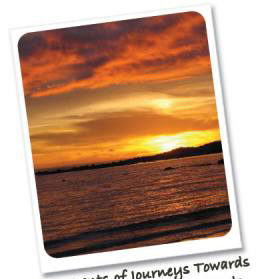Ben Glover reviews Fragments of Journeys Towards the Horizon by Ian Rowlands, a stripped down theatrical experience where emotions are laid bare.
by On The Edge, at The Riverfront
There is an alluring simplicity to any art form that has been stripped back to its fundamental foundations – it offers a sliver of opportunity to understand the essence of the craft, without the cluttering aesthetic burden of over-complication. This nakedness of performance, when all but the essential ideas of thought and form are exposed, can often reveal the fragility and purity of an artist’s motivation and vision. This is the seductiveness of a script-in-hand theatre production. It is naked, untrammelled and raw – it is the actors, the audience and an idea.
Fragments of Journeys Towards the Horizon by Ian Rowlands is a fine example of a stripped-down theatrical experience where emotions and ideas are laid bare. The set is little more than a void, dimly lit and oppressively black, save for three wire-frame lecterns that allow the protagonist the freedom to move with a purpose. Horizons is ushered in by a penetrating hissing that immediately discomforts and confuses the wary audience.
As the beginnings of a collaborative piece, between Ian Rowlands and Jeroen van den Berg, Horizons offers the audience a chance to glimpse the start of the creative process. The play itself is conducted as a highly unusual conversational monologue between the two fictitious writers at the beginning of their own collaboration; the Welsh protagonist Ian (Russell Gomer) and a Dutch friend, who is unseen and unheard. As the title suggests, the conversation is the fragments of Ian’s journey through his own life as he endeavours to discover why he can not trust another writer with his ideas. Relaying story upon story, Ian confronts his past demons, from lost friends to the terror of abandonment in lifeless, stark and alien environments. But always he returns to his own anguish as he remembers his rejection of others, as he seeks protection in solitude.
In this thinly veiled autobiographical piece, Rowlands attempts to understand the nature of theatrical collaboration through the exploration of friendship, loss of control and the impact of landscapes upon a person’s psyche. It is this final theme that makes for the most interesting study – how our subconscious is shaped and contextualised through our environment. Distinctions are implicitly pondered between the broad horizons of the Dutch Lowlands, in which the vast expanse of sky offers seemingly limitless opportunities, and the enclosed mountains of Wales which, it is hypothesised, can insulate and curtail personal ambitions. This metaphor allows the protagonist, Ian, to constantly question his ability to collaborate with anyone who does not share his perception of the world – attempting at every opportunity to discourage himself from a cooperative work.
The most sincere and challenging sections of Horizons are the fragments that Rowlands draws upon of his own personal experiences of loss and collaboration. The barely concealed hurt at the death of Ian’s Irish friend, Fergus, relies heavily upon Rowlands’ own recent experiences – indeed mention in the programme is given to Michael Diskin, ex-Director of The Town Hall Theatre, Galway, whom Rowlands describes as a ‘dear friend’. These passages elevates an intriguing examination into the nature of collaboration to an intense and captivating production that allows the audience to emotionally invest in an otherwise selfish and capricious character.
There has been a recent rise in script-in-hand theatre productions (honourable mention to Dirty Protest, a Cardiff based theatre company that has challenged many of the conventions of staid and traditional theatre) with varying results in quality. But Russell Gomer’s central performance is both enthralling and genuinely touching – the script-in-hand can often be clumsily handled, too often actors do not naturally engage with the audience, as if the script offers a physical and metaphorical barrier which is a burden to overcome. However, in Horizons, this is not an issue. Gomer ably traverses the potential pitfalls of stilted speech and awkward silence by making the script almost invisible; especially considering the sole focus of the audience’s attention is on the only figure in the void.
As with the start of any creative process, there are issues and limitations – the two-dimensional representation on the invisible Dutch friend who appears to be responding to Ian’s considerably more rounded character in simplistic national stereotypes, is an obvious concern. However, as this script is in development and is due to be reworked by Jeroen van den Berg, these reservations are little more than minor concerns. This play is the beginning of a process, with future readings at Oerol Theatre Festival (the largest site specific theatre festival in Europe), before returning to Wales in the autumn. It will be intriguing to see how Fragments of Journeys Towards the Horizon develops.
You might also like…
Emily Garside reviews the latest production from Company of Sirens, Twelve Cabins Twelve Vacancies, a slow-burning homage to childhood and Hitchcock.
Ben Glover is the managing editor of Wales Arts Review.












